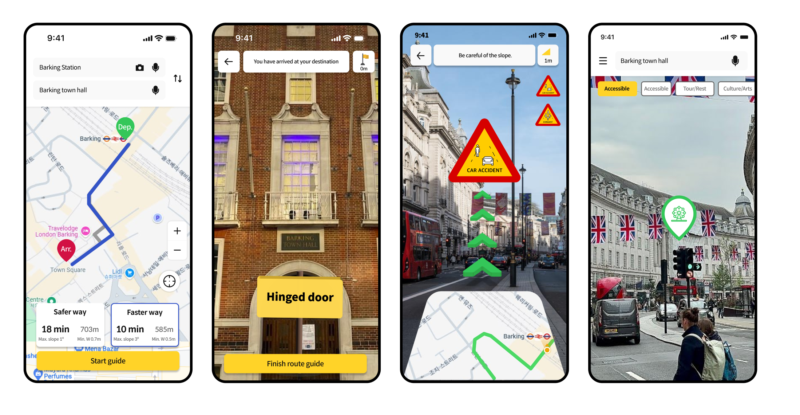People with mobility challenges—including individuals with disabilities, seniors, and families with young children—continue to face significant obstacles in their daily movements. Existing map services, designed primarily for vehicles, fail to provide essential information such as doorway widths, ramp availability, and elevator locations that are critical for accessible navigation. This automotive-centric approach has left the mobility rights of vulnerable pedestrians in a blind spot.
LBStech is addressing this fundamental gap with its innovative “Door Scanner” solution. The company collects and verifies pedestrian pathway data, then processes it through AI-based automation and standardization to serve smart city, mobility, tourism, and robotics industries. Their “Wheel AR” service, powered by augmented reality technology, delivers intuitive navigation that significantly enhances real-world mobility for users.

The numbers tell a compelling story: LBStech has secured over 7.8 million data points in Korea alone, with an additional 1 million data points added monthly. The company has successfully completed proof-of-concept projects in Vietnam, Japan, the UK, and the US, demonstrating its global scalability. International recognition followed, including awards at MWC 2023, a commendation from the US President, and the CES 2025 Innovation Award.
LBStech’s competitive advantages are clear and multifaceted. The company maintains data exclusivity by focusing on pedestrian pathways and doorway accessibility rather than vehicle routes. Its technological edge comes from combining crowdsourcing with AI automation. User-centered design—with direct participation from mobility-challenged individuals—ensures practical usability. Standardized data architecture enables seamless expansion into international markets.
Beyond serving mobility-challenged users, LBStech’s vision extends to establishing barrier-free smart city data standards that benefit everyone. The company’s approach transforms accessibility data from a niche concern into foundational infrastructure for the cities of tomorrow.
LBStech is participating in the 2025 Tourism Global Challenge program organized by the Ministry of Culture, Sports and Tourism and the Korea Tourism Organization, operated by CNTtech. Through this program, the company has gained invaluable access to global big tech companies and online travel agencies, received local market insights from Chinese mentors including VIVA and FESCARD, expanded its investor network, and increased media exposure—all critical elements for accelerating their global expansion.
Why do mobility-challenged pedestrians remain underserved by current navigation solutions?
Existing map services are designed around automobiles. They don’t include the information that mobility-challenged individuals actually need when moving through cities—details like whether doorways are wide enough for wheelchairs, where ramps are located, or how to find elevators. This affects people with disabilities, seniors, and families with young children who struggle to reach destinations safely and conveniently. Mobility is a fundamental right, yet many people remain excluded from this basic freedom.

How is LBStech solving this problem?
We’ve developed the Door Scanner solution to directly collect and verify pedestrian pathway data. We don’t just gather information—we process it through AI-based automation and standardization to make it usable across smart city, mobility, tourism, and robotics industries. Our Wheel AR service uses augmented reality to help users navigate more intuitively. We’ve successfully completed demonstrations both domestically and internationally.
What distinguishes LBStech from competitors?
Our biggest differentiator is data exclusivity. We collect large-scale pedestrian pathway and doorway data, not vehicle data. We currently have over 7.8 million data points, growing by more than 1 million monthly. Our combination of crowdsourcing and AI automation creates a powerful technological advantage.
Additionally, we involve mobility-challenged individuals directly in our service design process, ensuring user-friendly UX based on real experiences rather than theoretical assumptions. Our standardized data structure enables easy proof-of-concept implementation and scaling in cities worldwide.
What products and services do you currently offer?
We have three core products. First, Wheel AR is an AR-based navigation app that has completed domestic and international demonstrations. Door Scanner is a device for collecting doorway accessibility data, used for both data collection and ESG activities. Barrier-Free Walk Map is a customized map service for mobility-challenged pedestrians currently in pilot operation while we develop partnership models.

We’ve secured over 7.8 million data points in Korea and conducted international demonstrations in Vietnam, Japan, the UK, and the US.
Who are your target markets and key customers?
The global smart mobility and smart city markets are projected to reach hundreds of billions of dollars by 2030. We have four main customer groups: local governments and agencies implementing smart city and transportation accessibility policies, global online travel agencies like Trip.com, big tech platform companies like Tencent, and mobility and robotics companies working on autonomous driving and delivery robots.
How is your business model structured?
We operate on a B2B SaaS model, generating revenue through data API subscriptions and data pack sales. We also work on a B2G model with government and municipal data construction and verification projects.
What are your major achievements to date?
We’ve secured over 7.8 million pedestrian environment data points in Korea, increasing by more than 1 million monthly. We’ve received international recognition including the MWC 2023 Award, US Presidential Commendation, and CES 2025 Innovation Award.
We’ve actively conducted international demonstrations—a university campus project in New York, a barrier-free town demonstration in Birmingham, UK, and tourism sector demonstrations in Vietnam. We’re executing various government R&D projects and in discussions with global corporations for partnerships.
What makes your team competitive?
Our team consists of experts in GIS, AI, UX design, and technology development, working alongside advisory panels of mobility-challenged individuals. Our experience executing numerous domestic and international government projects and global proofs-of-concept is a key strength.
Most importantly, our philosophy drives us. We believe people matter more than technology, and we’re committed to creating people-centered barrier-free cities.
How is your international expansion progressing?
In the UK, we completed a barrier-free town demonstration in Birmingham. In the US, we’re working on a barrier-free campus project in New York. In Vietnam, we conducted barrier-free tourism site demonstrations. These projects confirm our global expansion potential.
How has this program helped with your international expansion?
We’ve gained opportunities to meet directly with global big tech companies and OTAs. We’ve acquired market insights through local Chinese mentoring from VIVA and FESCARD. Our investor network has expanded, and media exposure opportunities have increased significantly.
Can you give three reasons why investors should back LBStech?
First, differentiated data exclusivity. Our focus on pedestrian pathways and doorways clearly distinguishes us from vehicle-centric mapping services.
Second, global scalability. We’ve completed POCs in the US, UK, Vietnam, and other countries, confirming partnership potential with global enterprises.
Third, we combine social value with a solid revenue model. We align with ESG and DEI trends while maintaining stable monetization through B2B SaaS.
What’s your final message?
LBStech’s goal isn’t simply creating services for mobility-challenged individuals. Our vision is establishing barrier-free smart city data standards for everyone. The data we’re building can expand into autonomous driving, robotics, tourism, and other industries, becoming core infrastructure for the global mobility and smart city ecosystem. We want to use technology to create a better world.
MORE FROM THE POST
- OhMyHotel&Co: “Transforming Asia’s Hotel Industry with All-in-One SaaS Platform”
- PLAYLEGEND, “Revolutionizing Indoor Sports Entertainment with Immersive Digital Theme Parks”
- Go2Joy: “Pioneering Hourly Hotel Bookings to Transform Vietnam’s Hospitality Industry”
- Splab, “Umoh AI: Fully Automated 10K+ Attendee Conferences Start here.”
- THE HYUIL: “Building the Airbnb of Workation – Connecting Regions, Companies, and Digital Nomads”
Share
Most Read
- 1
- 2
- 3
- 4
- 5


Leave a Reply